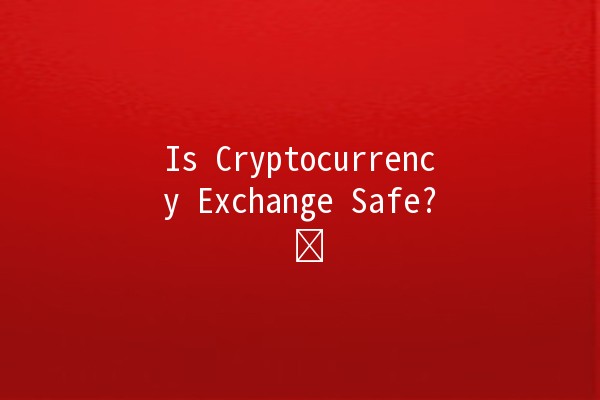
In recent years, cryptocurrency exchanges have gained immense popularity as platforms that allow users to buy, sell, and trade various cryptocurrencies like Bitcoin, Ethereum, and many others. However, with this surge in popularity, concerns about the safety and security of these exchanges have also risen. Many users wonder: Are cryptocurrency exchanges safe?
In this article, we will explore key factors regarding the safety of cryptocurrency exchanges, the common risks involved, and provide practical tips to safeguard your investments. Keep reading to learn everything you need to know about ensuring your security while trading cryptocurrencies.
Understanding Cryptocurrency Exchange Security
What is a Cryptocurrency Exchange?
A cryptocurrency exchange is an online platform that facilitates the buying, selling, and trading of cryptocurrencies. These exchanges can be categorized into two main types:
Examples: Binance, Coinbase, Kraken.
Examples: Uniswap, SushiSwap, PancakeSwap.

Common Security Risks in Cryptocurrency Exchanges
While many exchanges implement robust security measures, risks still exist. Understanding these risks is crucial for safeguarding your investments.
Five Practical Tips to Enhance Your Security While Using Cryptocurrency Exchanges
To mitigate risks and ensure your safety when trading cryptocurrencies, consider these practical tips:
When selecting a cryptocurrency exchange, prioritize platforms with a proven track record of security. Look for user reviews, regulatory compliance, and security certificates. Choosing a reputable exchange can significantly reduce your risk of exposure to hacks or scams.
Example: "Always check for exchanges that have undergone rigorous security audits and have insurance policies covering user funds."
Twofactor authentication adds an additional layer of security to your account. By requiring a second form of verification (such as a onetime code sent to your phone), it makes it much harder for unauthorized users to access your account.
Example: Most exchanges allow you to set up 2FA using apps like Google Authenticator or Authy, providing a secure code required for logins.
Creating strong passwords is essential for protecting your exchange accounts. Use a combination of upper and lowercase letters, numbers, and special characters. It is also crucial to avoid using the same password across multiple platforms.
Example: Consider utilizing a password manager to generate and store complex passwords securely.
Regularly updating your software (operating system, applications, and antivirus programs) helps protect against vulnerabilities that hackers can exploit. Implementing the latest security patches keeps your devices secure.
Example: Regularly update your mobile device and any wallets you use to ensure they have the latest security features.
For added security, consider withdrawing a significant portion of your funds into a secure hardware wallet or offline paper wallet. Keeping the majority of your assets in cold storage minimizes the risks associated with exchange hacks.
Example: "By using a Ledger or Trezor hardware wallet, you can store your cryptocurrency offline, making it far less accessible to hackers."
Frequently Asked Questions
Regulations surrounding cryptocurrency exchanges vary by country. In many jurisdictions, regulatory bodies are working on establishing laws to oversee the operations of these platforms, ensuring user protection. Nevertheless, not all exchanges adhere to these regulations, making it essential for users to research the laws in their region.
To identify potentially fraudulent exchanges, look for warning signs such as lack of transparency, poor customer reviews, slow customer service response times, and unverifiable claims of security. Additionally, verify the exchange's regulatory status and seek out community feedback before committing your funds.
If you realize you've fallen victim to a phishing scam, immediately change your passwords for the affected accounts and enable 2FA if you haven't already. Notify the exchange's support team and monitor your account activity closely. It is also recommended to inform local authorities.
Peertopeer (P2P) trading can be safe if conducted through reliable platforms that offer escrow services and user reviews. However, like all trading, risks exist, so it's essential to perform due diligence and use secure payment methods.
If you suspect your account has been compromised, take immediate action to secure it. Change your password, check for unauthorized transactions, and contact the exchange for further assistance. Monitoring your account for unusual activity is vital.
The best security practices for securing your cryptocurrency wallet include using strong passwords, enabling 2FA, updating software regularly, and backing up your wallet. Additionally, consider using hardware wallets for secure offline storage.
, while cryptocurrency exchanges can be a safe and effective way to trade digital currencies, users must be vigilant and proactive in safeguarding their investments. By understanding the security risks and implementing the tips provided, you can significantly reduce the likelihood of falling victim to fraud or losing your assets. Remember to always stay informed and practice good security hygiene to navigate the world of cryptocurrency safely.

